Welcome to our article on the meaning of minimalism. At first glance, minimalism may seem like a simple concept, often associated with decluttering our homes and possessions. However, minimalism is much more than that. It’s a lifestyle that emphasizes simplicity and intentional living. By removing the unnecessary, we make room for the things that truly matter in our lives.
Minimalism is about living intentionally, with purpose and clarity. It’s about focusing on what is truly important in our lives and letting go of the excess. By practicing minimalism, we can create a sense of calm, reduce stress, and increase overall well-being.
Key Takeaways:
- Minimalism is a lifestyle that goes beyond decluttering.
- It’s about intentional living and focusing on what truly matters.
- Minimalism can help reduce stress and increase overall well-being.
Understanding the Minimalist Lifestyle
At its core, the minimalist lifestyle is all about intentional living. It’s a conscious choice to prioritize the things that truly matter and let go of what doesn’t. Minimalism goes beyond decluttering and organizing our possessions; it’s a holistic approach to life that can have a profound impact on our well-being.
Living minimally means removing distractions and focusing on what brings us joy and fulfillment. It’s about aligning our actions with our values and making deliberate choices in all aspects of our lives.
Finances, relationships, and time management are all areas that can benefit from a minimalist approach. By simplifying these areas, we free up mental space and reduce stress, allowing us to live more fully in the present moment.
Intentional Living
At the heart of the minimalist lifestyle is intentional living. It’s about being mindful of our choices and actions and living in a way that aligns with our authentic selves. This means taking the time to reflect on our values and priorities and making deliberate decisions based on them.
Intentional living allows us to live a more meaningful and purposeful life. We become more aware of our surroundings and appreciate the simple things in life. By living intentionally, we can reduce the clutter in our lives and focus on what truly matters.
Embracing a minimalist lifestyle can be a transformative journey. It requires us to be open to change and willing to let go of what no longer serves us. By living intentionally, we can create a life that is fulfilling and aligned with our true selves.
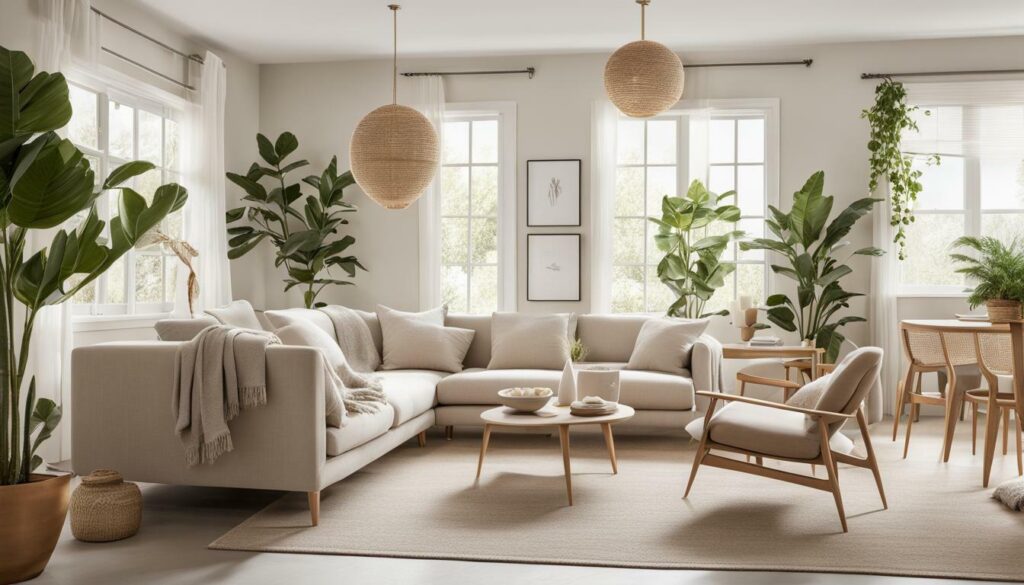
“Minimalism is not a lack of something. It’s simply the perfect amount of something.”
– Nicholas Burroughs
Financial Minimalism
Financial minimalism is about simplifying our finances and living within our means. It means prioritizing our spending based on our values and cutting out unnecessary expenses. By living frugally and saving money, we can reduce financial stress and achieve greater financial freedom.
Living minimally doesn’t mean sacrificing our financial goals; in fact, it can help us achieve them. By being more mindful of our spending habits, we can make intentional choices that align with our long-term financial goals.
Simplicity in Relationships
Minimalism can also be applied to our relationships. By simplifying our social lives and focusing on meaningful connections, we can cultivate deeper and more fulfilling relationships. This means letting go of toxic relationships and nurturing the ones that truly matter.
Living minimally in relationships also means setting boundaries and being mindful of our time and energy. By prioritizing the relationships that bring us the most joy, we can create a more balanced and fulfilling social life.
Embracing Minimalistic Design
Minimalistic design is all about simplicity, clean lines, and functionality. It focuses on the essentials, removing any unnecessary elements, and creating a clutter-free environment. It is a design style that has become increasingly popular in recent years, and for a good reason.
Minimalistic design can add a calming and peaceful atmosphere to any space. It can create a sense of order and balance, promoting relaxation and well-being. This is because minimalistic design often involves neutral colors, natural light, and open spaces, providing an inviting and comfortable ambiance.
One of the key principles of minimalistic design is the use of negative space. Negative space is the area around and between objects and is just as important as the objects themselves. By using negative space, minimalistic design creates visual balance and harmony, allowing the eye to rest and appreciate the simplicity of the design.
Another characteristic of minimalist design is the use of geometric shapes. Triangles, squares, and circles are often used in minimalistic design to create a sense of order and structure. These shapes can be used in various ways, such as patterns, textures, or even as standalone pieces.
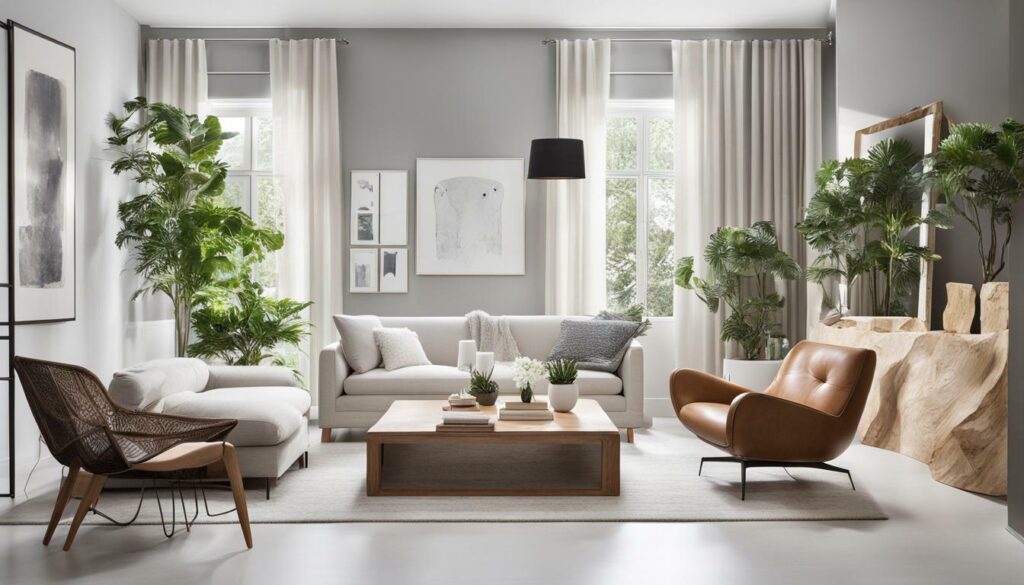
Minimalistic design is not limited to interior design. It can also be applied to graphic design, web design, and even fashion. For example, a minimalistic website design can offer a seamless and user-friendly experience, while a minimalist wardrobe can save time and money by focusing on a few versatile pieces.
Overall, minimalistic design is a beautiful and practical approach to design that can enhance any space or product. Its focus on simplicity, functionality, and negative space creates a harmonious and relaxing environment, promoting both physical and mental well-being.
Embracing Minimalistic Art
Minimalist art is a form of art that prioritizes simplicity and minimalism over complexity and detail. This art style emerged in the 1960s and was characterized by a focus on geometric shapes, monochromatic colors, and a rejection of traditional art values and conventions.
Minimalist artists believed that art should not represent anything other than itself and that the viewer’s experience should be focused purely on the artwork. They intentionally used minimal elements to convey powerful messages and evoke emotions, often leaving interpretation up to the viewer.
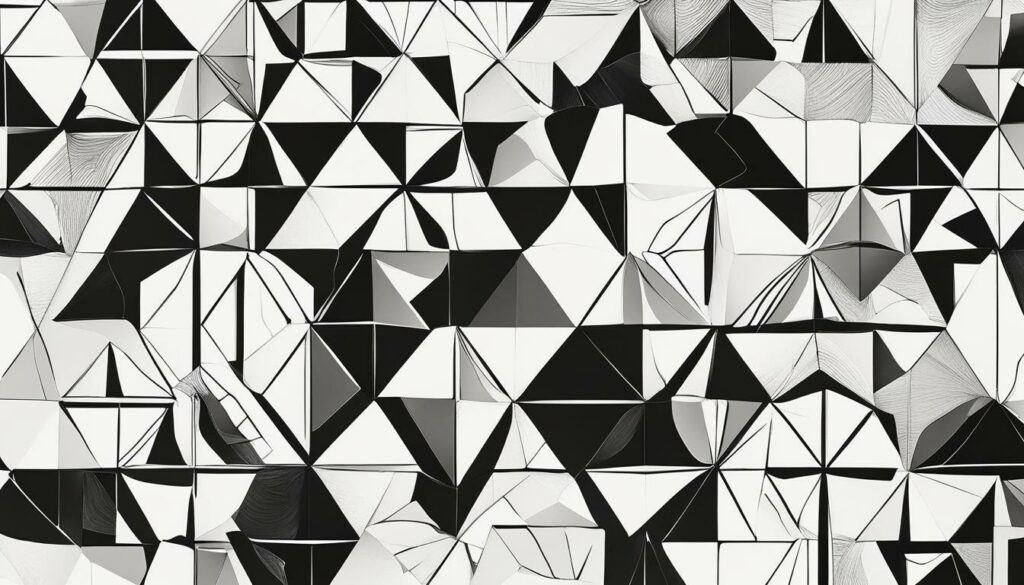
This image is an example of minimalist art, with its simple geometric shapes and muted colors. The viewer’s attention is drawn to the composition and arrangement of the shapes rather than any specific subject matter.
Minimalist art often creates a sense of calm and harmony, as the lack of distraction allows the viewer to focus solely on the artwork. It can be seen as a form of meditation, as it prompts introspection and contemplation.
Overall, minimalist art exemplifies the philosophy of less is more and the beauty of simplicity. It challenges us to reevaluate our preconceived notions of what constitutes art and encourages us to appreciate the power of minimalism in all aspects of life.
The Philosophy Behind Minimalism
At the heart of minimalism lies a unique philosophy that challenges our relationship with consumerism and material possessions. Rather than blindly pursuing more wealth and possessions, minimalism encourages us to focus on what truly matters in life.
At its core, minimalism is an intentional way of living that prioritizes experiences over possessions. It’s about identifying our values and aligning our actions with them, allowing us to live a more purposeful and fulfilling life.
The Minimalistic Approach
The minimalist philosophy is grounded in the belief that less is more. In a world that often values excess and indulgence, minimalism encourages us to embrace simplicity and mindfulness in all aspects of life. By taking a minimalistic approach to our possessions, relationships, and time, we can free ourselves from the distractions and stresses of modern life.
“The things you own end up owning you.” – Chuck Palahniuk
The Minimalistic Lifestyle
Living a minimalist lifestyle means intentionally simplifying our lives in order to focus on what truly matters. It’s about seeking quality over quantity and fostering meaningful connections with those around us. By making deliberate choices about how we spend our time and resources, we can create a life that is both fulfilling and sustainable.
Ultimately, the minimalist philosophy encourages us to look beyond material possessions and focus on creating a life that is rich in experiences, relationships, and personal growth.
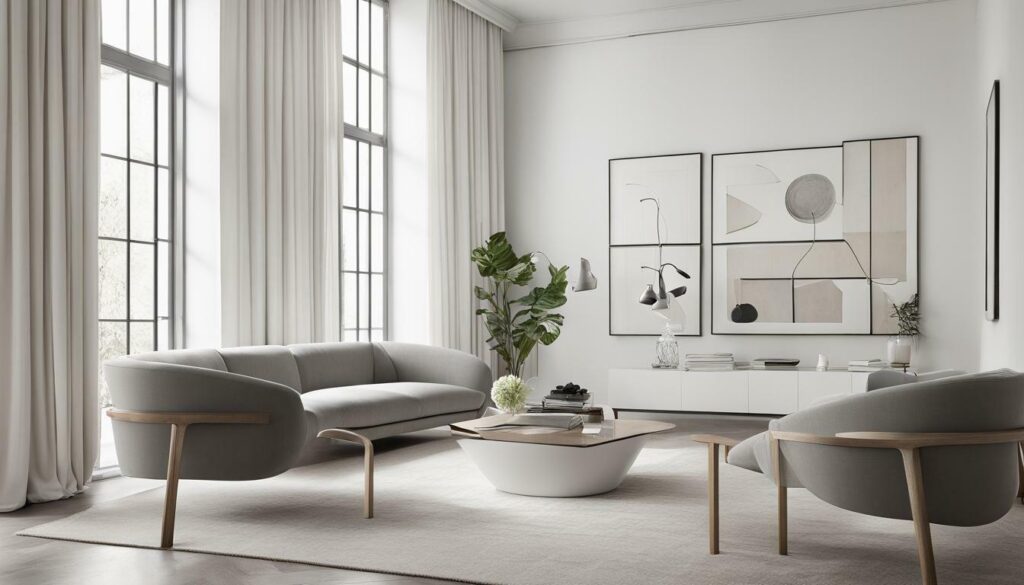
The Benefits of Minimalism
Adopting a minimalist lifestyle can have a range of benefits, including reduced stress, increased productivity, and improved overall well-being. By simplifying our lives and focusing on our priorities, we can create a sense of calm and purpose that is often missing in today’s fast-paced world.
Minimalism also offers an opportunity to reduce our environmental impact by consuming fewer resources and producing less waste. By embracing intentional living and minimal consumption, we can create a more sustainable future for ourselves and future generations.
The Power of Decluttering
Decluttering is an essential component of the minimalist lifestyle, as it allows us to simplify our physical and mental space, promoting a sense of calm and focus. When we declutter, we let go of the excess possessions and commitments that no longer serve us, creating more time and energy for the things that truly matter.
Minimalism teaches us to value experiences over possessions, and decluttering allows us to prioritize those experiences by eliminating distractions and unnecessary clutter. By clearing our physical space, we also create more mental space, allowing us to think more clearly and productively.
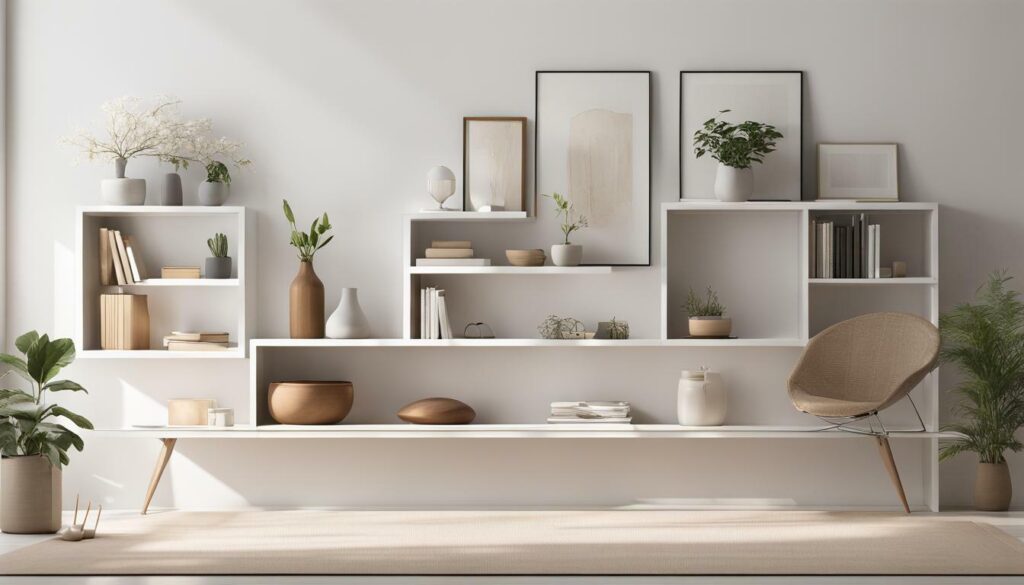
Decluttering can be a daunting task, but it doesn’t have to be overwhelming. We suggest starting small, perhaps with one room or even one drawer at a time. Consider the items that bring you joy and serve a purpose in your life, and let go of the rest.
As you progress in your decluttering journey, you may find that you feel lighter and more energized. You may also notice that you have more time and space to focus on the things that truly matter to you.
“Minimalism is the intentional promotion of the things we value most and the removal of anything that distracts us from it.” – Joshua Becker
Decluttering is a powerful tool that can help us align our actions with our values, promoting intentional living and a more meaningful existence. Whether it’s clearing out physical possessions or decluttering our schedule, minimalism teaches us to let go of the excess and focus on what truly matters.
Minimalism: A Journey of Self-Discovery
Embracing minimalism can be a transformative journey of self-discovery. When we choose to live intentionally and simplify our lives, we are forced to confront our values and priorities. This can prompt introspection and lead to personal growth.
Through our minimalist journey, we learn to evaluate our possessions, relationships, and commitments. We question what truly brings us joy and fulfillment. In doing so, we may find that we have been living on autopilot, going through the motions without much thought to our actions.
Minimalism encourages us to slow down and be mindful. By stripping away the excess, we are left with what is truly meaningful to us. This can be a powerful tool for getting to know ourselves better and living a more authentic life.
How Minimalism Helps Us Find Ourselves
Living a minimalist lifestyle helps us find ourselves in several ways:
- We clarify our values: By simplifying our lives, we are better able to see what truly matters to us. We can clarify our values and priorities, and make intentional choices that align with them.
- We discover our passions: With fewer distractions, we are better able to explore our interests and hobbies. This can lead to discovering new passions or reigniting old ones.
- We develop self-awareness: By paying attention to what truly brings us joy and fulfillment, we become more self-aware. We learn what our triggers and stressors are, and how to manage them more effectively.
Through these processes, we develop a stronger sense of self and become more confident in our actions and decisions.
“The process of letting go is like taking off a tight shoe. It’s initially uncomfortable, but the relief is worth it.” – Joshua Becker
Minimalism as a Tool for Personal Growth
Minimalism can be a powerful tool for personal growth. By embracing simplicity and intentional living, we can:
- Reduce stress and anxiety: By reducing the clutter in our physical and mental space, we can reduce stress and anxiety. This allows us to be more present and focused on the things that matter most.
- Improve relationships: By prioritizing our relationships and letting go of toxic ones, we can improve the quality of our connections. We can also cultivate more meaningful relationships by being fully present and engaged.
- Pursue our dreams: By simplifying our lives, we create more time and space to pursue our dreams. We can focus on what truly brings us joy and fulfillment, and take deliberate steps towards achieving our goals.
Minimalism is not just about decluttering our physical space. It is a way of life that can help us find purpose and meaning in our lives. It encourages us to live intentionally, prioritize what truly matters, and cultivate a deep sense of self-awareness. By embarking on a minimalist journey, we can unlock our full potential and live a more fulfilling life.

Finding Simplicity in Everyday Life
Living a minimalist lifestyle is not just about decluttering; it is also about embracing simplicity in every aspect of our lives. Here are some practical tips on how to simplify your daily routines, relationships, and possessions.
1. Simplify Your Morning Routine
Mornings can be hectic, but a simple routine can make them more manageable. Try laying out your clothes the night before, preparing breakfast ahead of time, and limiting your use of technology in the morning to reduce stress.
2. Prioritize Meaningful Relationships
Minimalism is about focusing on what matters most. Spend time with people who bring joy and positivity to your life. Limit your social media usage and commit to being present during face-to-face interactions.
3. Practice Mindful Consumption
Avoid impulse purchases and only buy what you truly need. Consider the environmental impact of your purchases and opt for sustainable options when possible. Practice “one in, one out” and donate items you no longer need.
4. Embrace Digital Minimalism
Digital clutter can be just as overwhelming as physical clutter. Unsubscribe from unnecessary emails, delete unused apps, and limit your screen time to preserve mental energy.
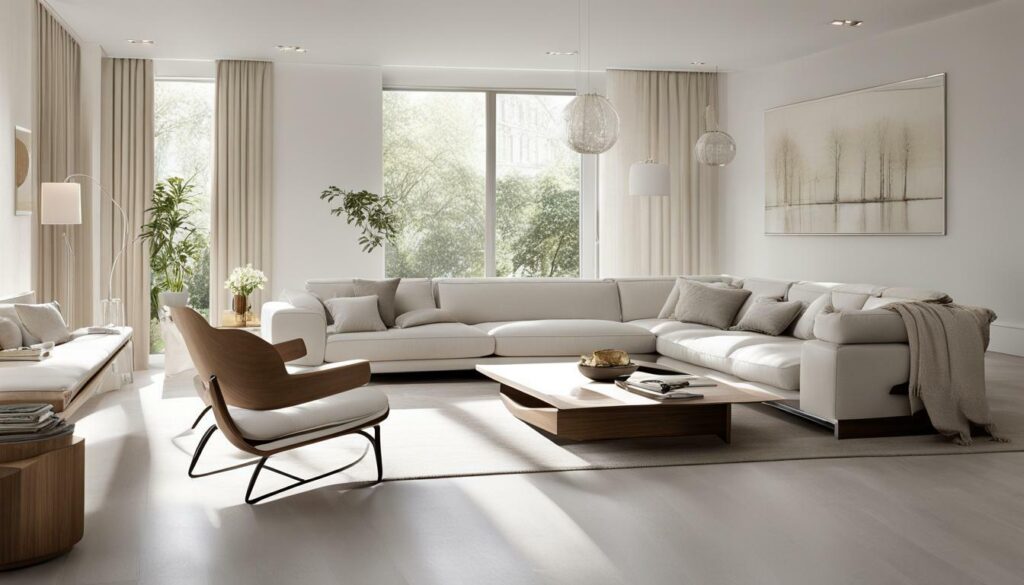
Creating a minimalist home can also promote simplicity in your life. Having a clutter-free living space can reduce stress and improve overall well-being. Remember, minimalism is a journey and the key is to focus on progress, not perfection.
Overcoming Challenges on the Minimalist Journey
Adopting a minimalist lifestyle can present several challenges, but it’s important to remember that everyone’s journey is unique. Here are some tips to help you overcome obstacles that may arise:
- Resisting Societal Pressures: It’s easy to feel pressure to keep up with the latest trends or accumulate possessions, but it’s important to recognize that this mindset is not sustainable. Remember that you are choosing a lifestyle that aligns with your values and priorities, and stay true to yourself.
- Dealing with Sentimental Attachments: Letting go of sentimental items can be difficult, but it’s important to remember that memories are not stored in material possessions. Consider taking a picture of the item or finding a way to repurpose it, and remember that the memories associated with it will always be with you.
- Staying Motivated: It’s easy to lose motivation on any journey, but it’s important to stay focused on the benefits of living a minimalist lifestyle. Remember that it’s not about perfection, but progress. Celebrate small victories and remind yourself why you started.
By overcoming these challenges, you can continue to embrace intentional living and experience the many benefits of a minimalist lifestyle.

Minimalism and Sustainability: A Perfect Match
At its core, minimalism encourages intentional living and the avoidance of excessive consumption. This aligns naturally with sustainability efforts, as we learn to prioritize the essentials and reduce waste.
By questioning our possessions and choosing to own less, we reduce our carbon footprint and the demand for new resources. Furthermore, by embracing a minimalist lifestyle, we often discover the joy and fulfillment that come from experiences rather than things. This can lead to a shift in values towards sustainability and environmental consciousness.
In addition, minimalism promotes the use of sustainable products and materials. By investing in quality, long-lasting items, we reduce the need for constant replacement and disposal, contributing to sustainable practices.
Ultimately, by adopting a minimalist lifestyle, we can contribute to a more sustainable future while also finding purpose and fulfillment in intentional living.
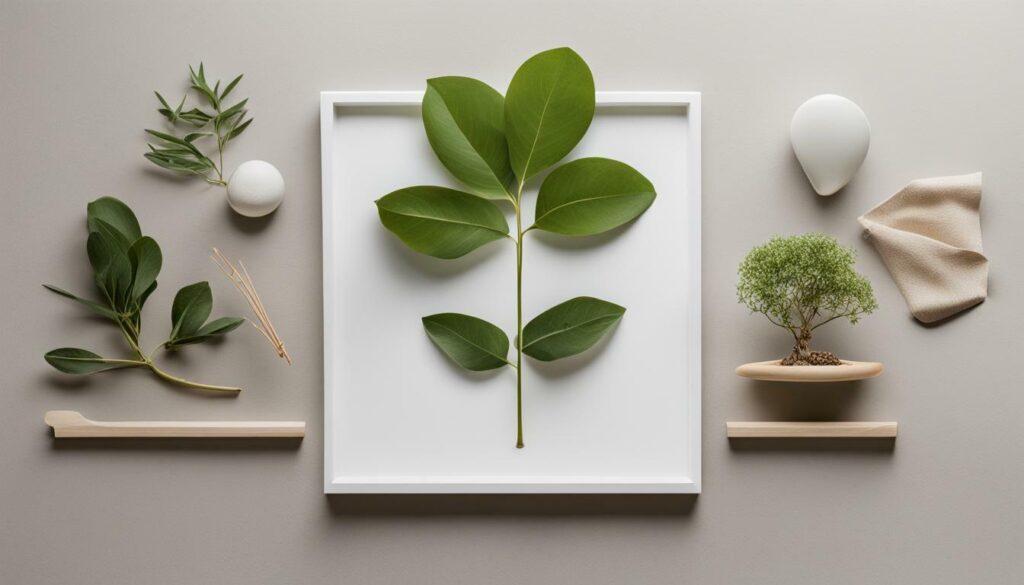
Conclusion: Living a Meaningful Minimalistic Life
We hope that this article has provided you with valuable insights into the meaning of minimalism and the potential it holds for improving our lives. From intentional living to minimalist design, minimalism encompasses a wide range of aspects and can have a profound impact on our physical, mental, and emotional well-being.
At its core, minimalism is about questioning the status quo, prioritizing what truly matters, and simplifying our lives to create more space for purpose and fulfillment. By embracing a minimalist lifestyle, we can cultivate a sense of clarity, focus, and intentionality in our daily lives.
Living a Minimalist Lifestyle is a Journey
Living a minimalist lifestyle is not a destination but a journey. It requires ongoing reflection, evaluation, and intentionality. As we navigate this journey, we may encounter challenges and setbacks, but we can also experience incredible growth, transformation, and self-discovery.
The Benefits of Embracing Minimalism
Embracing minimalism can have a wide range of benefits, including reduced stress and anxiety, improved focus and productivity, enhanced relationships, and increased financial freedom. By consciously choosing to simplify our lives, we can create space for the things that truly bring us joy and fulfillment.
Ultimately, living a meaningful minimalistic life is about aligning our actions with our values, prioritizing our relationships and experiences, and creating a life that reflects our authentic selves. We encourage you to continue exploring the world of minimalism and discover how it can enrich your life.
FAQ
Q: What is minimalism?
A: Minimalism is a lifestyle that goes beyond decluttering. It focuses on simplicity and intentional living, allowing individuals to prioritize what truly matters in life.
Q: How does minimalism encompass various aspects of life?
A: The minimalist lifestyle extends to finances, relationships, and time management. It encourages intentional living and making deliberate choices that align with our values.
Q: What is minimalistic design?
A: Minimalistic design emphasizes clean lines, simplicity, and functionality. It creates a sense of calm and promotes a clutter-free environment.
Q: What is minimalist art?
A: Minimalist art uses minimal elements to convey powerful messages and evoke emotions. It celebrates the beauty of simplicity in art.
Q: What is the philosophy behind minimalism?
A: Minimalism encourages questioning consumerism, prioritizing experiences over possessions, and focusing on what truly matters in life.
Q: What are the benefits of decluttering?
A: Decluttering our physical and mental space can lead to reduced stress, increased productivity, and improved overall well-being.
Q: How can embracing minimalism be a transformative journey?
A: Embracing minimalism prompts introspection, helps evaluate priorities, and aligns actions with authentic selves, leading to personal growth and fulfillment.
Q: How can we find simplicity in everyday life?
A: Finding simplicity involves simplifying routines, relationships, and possessions to focus on what brings joy and fulfillment.
Q: What challenges may arise when adopting a minimalist lifestyle?
A: Challenges include societal pressures, dealing with sentimental attachments, and staying motivated. However, there are strategies to overcome these obstacles.
Q: What is the connection between minimalism and sustainability?
A: Minimalism and sustainability align through intentional living and minimal consumption, contributing to environmental consciousness and positive impact.
Q: How does minimalism bring purpose and fulfillment to our lives?
A: Minimalism goes beyond decluttering, offering a meaningful way to live by prioritizing what truly matters and living with intention.


Comments are closed.